What's New
Displaying results 3371 - 3380 of 4924
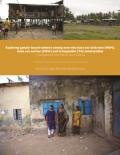
Resource | Publications,
Gender-based violence (GBV) is commonly thought of as an issue affecting primarily women and girls; however, stigma, discrimination and violence are also expressed toward men who have sex with men (MSM), male sex workers (MSW), and transgender (TG) individuals. While there is an increasing body of research among sexual minorities identifying the association between GBV and physical and mental health issues, including increased risk of contracting HIV, programs for these populations tend to focus on raising HIV awareness to reduce sexual risks. A better understanding of GBV among MSM/MSW/TG populations is necessary in order to develop clear and targeted recommendations for future interventions targeting this issue.
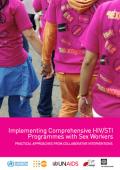
Resource | Publications,
This tool is the product of collaboration among sex workers, service providers, researchers, government officials and nongovernmental organizations (NGOs) from around the world, as well as United Nations agencies, and development partners from the United States. The tool is aligned with the 2012 Recommendations. It also refers to a global consultation conducted with sex workers by NSWP as part of the process of developing the 2012 Recommendations. This consultation document is referred to in this tool as the “values and preferences survey”.
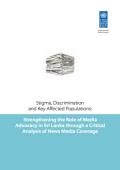
Resource | Publications,
The report aims to demonstrate the role of media in reflecting and perpetuating stigma and discrimination against key affected population and people living with HIV by identifying key issues and challenges and provide recommendations for strengthening the role of media advocacy in creating an enabling environment for HIV prevention, treatment and care.
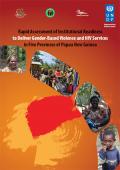
Resource | Publications,
HIV and gender-based violence (GBV) remain major challenges to the development of Papua New Guinea (PNG). With the national HIV prevalence rate still hovering at about 1 per cent, and reported cases of GBV on the increase, stepping up services delivery is critical in response to these two major issues.
Given the close linkage between HIV infection and gender-based violence, the National AIDS Council Secretariat, as the mandated coordinating body for the HIV response in PNG and with support from United Nations Development Programme (UNDP), instituted this study to assess the readiness of service providers to deliver HIV and GBV services. This assessment is also a follow-up to a 2010 snapshot assessment on progress made in PNG towards the achievement of Millennium Development Goals 3 (promote gender equality and empower women) and 6 (combat HIV/AIDS, malaria, and other dieseases), with specific focus on the readiness of services across the HIV/health, justice, and social sectors from five selected provinces.

Resource | Publications,
Violence against women is not a new phenomenon, nor are its consequences to women’s physical, mental and reproductive health. What is new is the growing recognition that acts of violence against women are not isolated events but rather form a pattern of behaviour that violates the rights of women and girls, limits their participation in society, and damages their health and well-being. When studied systematically, as was done with this report, it becomes clear that violence against women is a global public health problem that affects approximately one third of women globally.
This report, developed by the World Health Organization, the London School of Hygiene and Tropical Medicine and the South African Medical Research Council presents the first global systematic review and synthesis of the body of scientific data on the prevalence of two forms of violence against women — violence by an intimate partner (intimate partner violence) and sexual violence by someone other than a partner (non-partner sexual violence). It shows, for the first time, aggregated global and regional prevalence estimates of these two forms of violence, generated using population data from all over the world that have been compiled in a systematic way. The report also details the effects of violence on women’s physical, sexual and reproductive, and mental health.
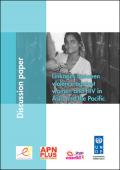
Resource | Publications,
There is limited research conducted in the Asia-Pacific region exploring the linkages between HIV and violence against women (VAW). While research conducted in sub-Saharan Africa and in hyper-epidemic settings have established that violence against women drives and fuels the HIV epidemic, there has been little analysis done in countries with concentrated epidemics such as those in the Asia-Pacific region, and therefore little is known about how they overlap. Perhaps as a result, policy and programmatic responses on VAW and HIV are not always coordinated and often run in parallel.
This Discussion Paper was commissioned to review and analyse existing qualitative and quantitative research on the relationship between violence against women and girls and HIV in the region. The paper clearly demonstrates that violence is a risk factor for HIV, with women living with HIV more likely to report a history of violence. It also shows that HIV is a risk factor for violence, including from intimate partners. It also demonstrates that key HIV-affected groups of women and girls, particularly sex-workers and female drug users, face disproportionate violence.
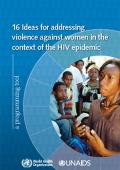
Resource | Tools,
The current publication helps intended users in considering 'what' are some effective or promising strategies to consider. It does not provide detailed guidance on 'how to' implement them. It intentionally focuses on specific forms of violence that are most common in women's lives globally, that are most relevant for the HIV epidemic, and for which there is more evidence on promising interventions: intimate partner violence, sexual violence by non-partners and violence experienced by women in selected key populations, such as sex workers.
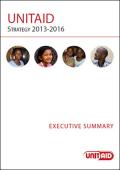
Resource | Publications,
The purpose of UNITAID is to contribute to the achievement of global long-term goals for HIV, tuberculosis and malaria through its interventions in product markets. These goals have determined the Strategic Objectives described in this Strategy for the coming four years and are shared by the international community at large. The Strategic Objectives have also been guided by the market landscapes, which UNITAID regularly publishes and updates twice a year, and which identify opportunities for market interventions. The Objectives have been divided into three categories: active (UNITAID already supports interventions that will continue throughout the period of the Strategy), potential (clearly identified by the landscapes but not yet considered for funding) and exploratory (identified by experts and stakeholders but not yet vetted through landscape analysis).
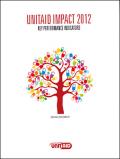
Resource | Publications,
The purpose of this report is to highlight new developments and key challenges that UNITAID has faced as an organization and donor during 2012. This report will be the last to follow the Board approved key performance indicators (KPIs) set for the UNITAID Strategy 2010-2012. The report summarizes UNITAID’s results measured against the targets for 2012 set by its Executive Board at the beginning of the Strategy cycle for 2010-2012.
The report summarizes UNITAID's results measured against the targets for 2012 set by its Executive Board at the beginning of the Strategy cycle for 2010-2012.
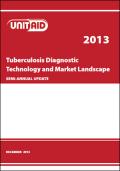
Resource | Publications,
This document is a semi-annual update to the second edition report. The purpose of this document is to highlight developments that have occurred since July 2013 – namely, in the areas of policy development, implementation and scale-up of the Xpert® MTB/RIF assay and efforts to define the characteristics of next-generation molecular tests that could replace smear microscopy. An updated technology pipeline is included for reference; however, a detailed report on newer technologies, including technologies other than nucleic acid amplification tests (NAATs), will be published in 2014 (third edition).





